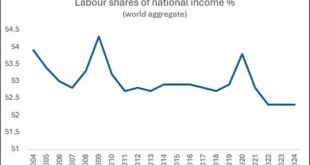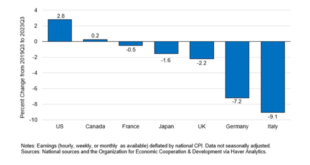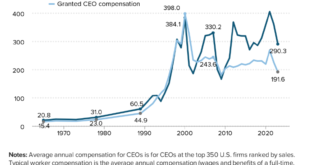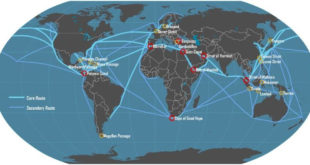from C. P. Chandrasekhar and Jayati Ghosh The latest World Employment and Social Outlook Report (update for September 2024) from the International Labour Organisation highlights some disturbing trends. Importantly, it identifies a significant decline and then stagnation in the share of labour income in GDP, for the world as a whole, in the past few years. This comes as part of a persistent trend of decline in labour income shares, other than spikes in “crisis years” like 2008-10 and...
Read More »Deputy sheriff or imperial outpost ?
Via Peter Hartcher in the Nine papers, I learned the other day that Albanese snubbed President Prabowo of Indonesia to meet King Charles. The immediate decision before the Albanese government was how to deal with two important heads of state asking for attention at almost exactly the same time. The prime minister had a long-standing invitation to the inauguration of the new president of Indonesia in Jakarta on Sunday, and a request for a visit by the British monarch to begin on the...
Read More »Breaking boundaries in economics: Rediscovering the roots of welfare
from Asad Zaman and WEA Pedagogy Blog 1. The Methodenstreit: How Economics Forgot History In the late 19th century, economics experienced a deep philosophical debate over methodology, known as the Methodenstreit, or Battle of Methodologies. Geoffrey Hodgson, in his book How Economics Forgot History, emphasizes the critical nature of this debate. The essential conflict was between those who believed that historical context and specificity are crucial for understanding economic phenomena,...
Read More »The death of the book, again
We’re in another round of concern about the “death of the book”, and, in particular, the claimed inability or unwillingness of young people to read full-length books. I’m not going to push too far on the argument that this complaint is ancient, but I can’t resist mentioning the response of my younger brother, who, when asked if he wanted a book for Christmas, answered “thanks, but I already have one”). That was around 50 years ago, and he went on to a very successful legal career....
Read More »Pathways to sustainability (1)
from Maria Alejandra and WEA Pedagogy Blog Setting the scene Economists and policymakers continue to dominate headlines with the conceptualization of “sustainability,” “sustainable investing,” and “sustainable finance,” along with their various worldwide geographical manifestations. The prevailing scenario, which is characterized by conflict, economic instability, and political disputes, is not favorable to incorporating sustainability into investment decisions. However, pressing...
Read More »How to deal with inflation?
In Europe (the Euro area, to be precise), both unemployment and inflation are down, according to Eurostat,. Which, again, shows that the Phillips curve, a crucial concept behind neoclassical macroeconomic thinking that assumes a more or less stable negative relation between unemployment and inflation (high unemployment will bring inflation down), is not the place to go when predicting or analysing inflation. Sometimes, this relation is specified as a relation between wage increases and...
Read More »The 2024 economic sciences laureates
from Lars Syll The Sveriges Riksbank Prize in Economic Sciences in Memory of Alfred Nobel 2024 is awarded to Daron Acemoglu, Simon Johnson and James Robinson “for studies of how institutions are formed and affect prosperity.” Daron Acemoglu and James Robinson’s work, particularly in Why Nations Fail (2012), is widely recognized within new institutional economics for its argument that inclusive political and economic institutions are key determinants of long-run prosperity and...
Read More »CEO-to-worker compensation ratio, 1965-2023
The European Central Bank and the return of history
The end of the post-World War II ´Pax Americana, an almost eighty-year period of peace for European countries allied with the USA, will soon lead the EU to end the prohibition of monetary financing of governments by the European Central Bank (ECB). This might take the shape of the ECB providing credit to an entity purchasing Eurobonds, which will further increases military spending. At this moment, there is based on the Maastricht treaty of 1992 a strict prohibition of monetary financing...
Read More »The US just lost a war and nobody noticed
Over the eight decades following the end of World War II, the US has taken part in dozens of land wars, large and small. The outcomes have ranged from comprehensive victory to humiliating defeat, but all have received extensive coverage. By contrast, the US Navy’s admission of defeat in its longest and most significant campaign in many decades, has received almost no attention. Yet the failure of attempts to reopen the Suez Canal to shipping has fundamental implications for the entire...
Read More » Heterodox
Heterodox





